The case for a vote to restore jobs and health
It's not a left or a right thing.
It's not a Republican or a Democrat thing.
It's just a competence thing.
It's costing our country its jobs, and it's costing our people their health.
It's prolonging our pain through this very real macroeconomic and public health crisis.
There is too much at stake in the economy, even when you put aside digging ourselves out of the greatest recession since the Great Depression, and digging ourselves out of the public health impact of Covid-19.
Even in January 2020, before Covid-19 struck, our economy faced extreme levels of wealth inequality, a shaky credit system, a precarious workforce, rising automation, and thus rising unemployment, with stagnant wage growth and increased educational and healthcare costs for the average American.
Covid-19 simply exacerbated all of these underlying conditions, and laid bare how little Trump had done in the economy, other than to ride the coat-tails of the bullish stock market and strong employment market of 2011-2020, 5 years of which happened under Obama's term.
Prior to January 2020, we were on exactly the same jobs growth path that had started with the 2010 turnaround, after the 2008 financial crisis. Trump did not, in any way, change the curve.
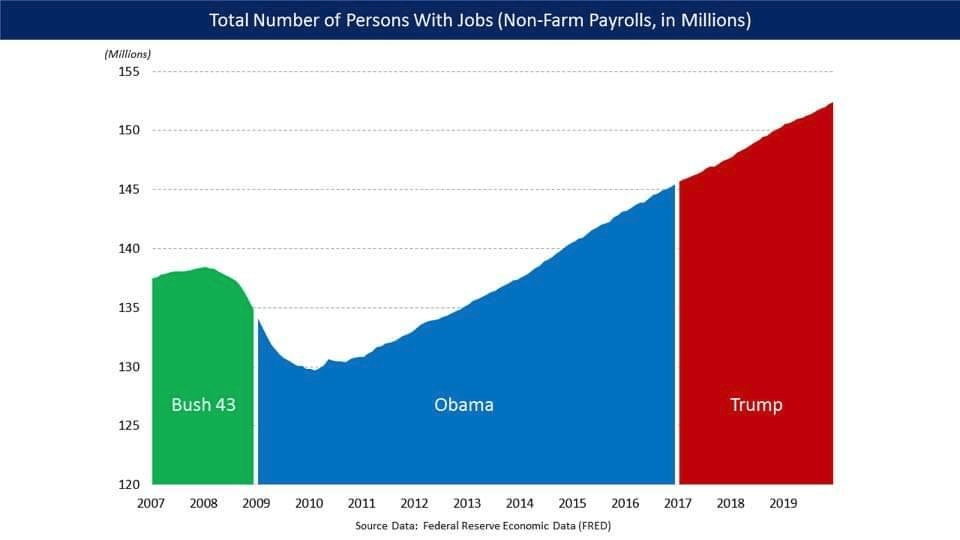
As you can see, there was a 2008-2010 recession, caused by the financial crisis at the tail end of G. W. Bush's term, and then a post-2010 recovery, partially helped by Obama's federal policy, a strong response from The Fed, and the rebounding economy (and yes, the stock market, too).
When Trump took over, nothing changed on this trajectory. And that was true for his first 3 years. You can draw a straight line in the above graph from 2013 (last 3 years of Obama's term) through to 2019 (first 3 years of Trump's).
What about the famous "Trump Tax Cuts" of 2017? The biggest impact of these cuts were reducing the already-low corporate tax rate, and cutting taxes on the already-lightly-taxed top 10% and top 1% of wealth-holders and earners in society. As the NY Federal Reserve Chair said shortly after the law passed:
"... most of the tax cuts accrue to the corporate sector and to higher-income households that have a relatively low marginal propensity to consume. This suggests that a significant portion of the tax cuts will be saved, not spent."
And even though the claim was that the tax cuts would fuel job growth, as you can see in the chart above, job growth remained at the same exact rate as under Obama. In fact, a survey of corporate economists found:
"... 84% reported their firms had not changed their investment or hiring plans due to the tax cut."
So, again, Trump's first 3 years were essentially to "do nothing" on the economy, and ride out the positive wave that had started before he took over.
But, by March of 2020, we had entered the worst economic recession since the Great Depression. We wiped out all of the job gains of the prior 3 years.
In fact, it was the worst period of job losses of the last 7 decades. And the amount of harm that families and workers felt through this period was entirely preventable.
The below NYTimes front-page from May 2020 illustrates with the graphic and headline. The graph goes back to 1946 — the end of WW2 — on the left-hand side. The job losses were so staggering, they flow down the right side of the page.
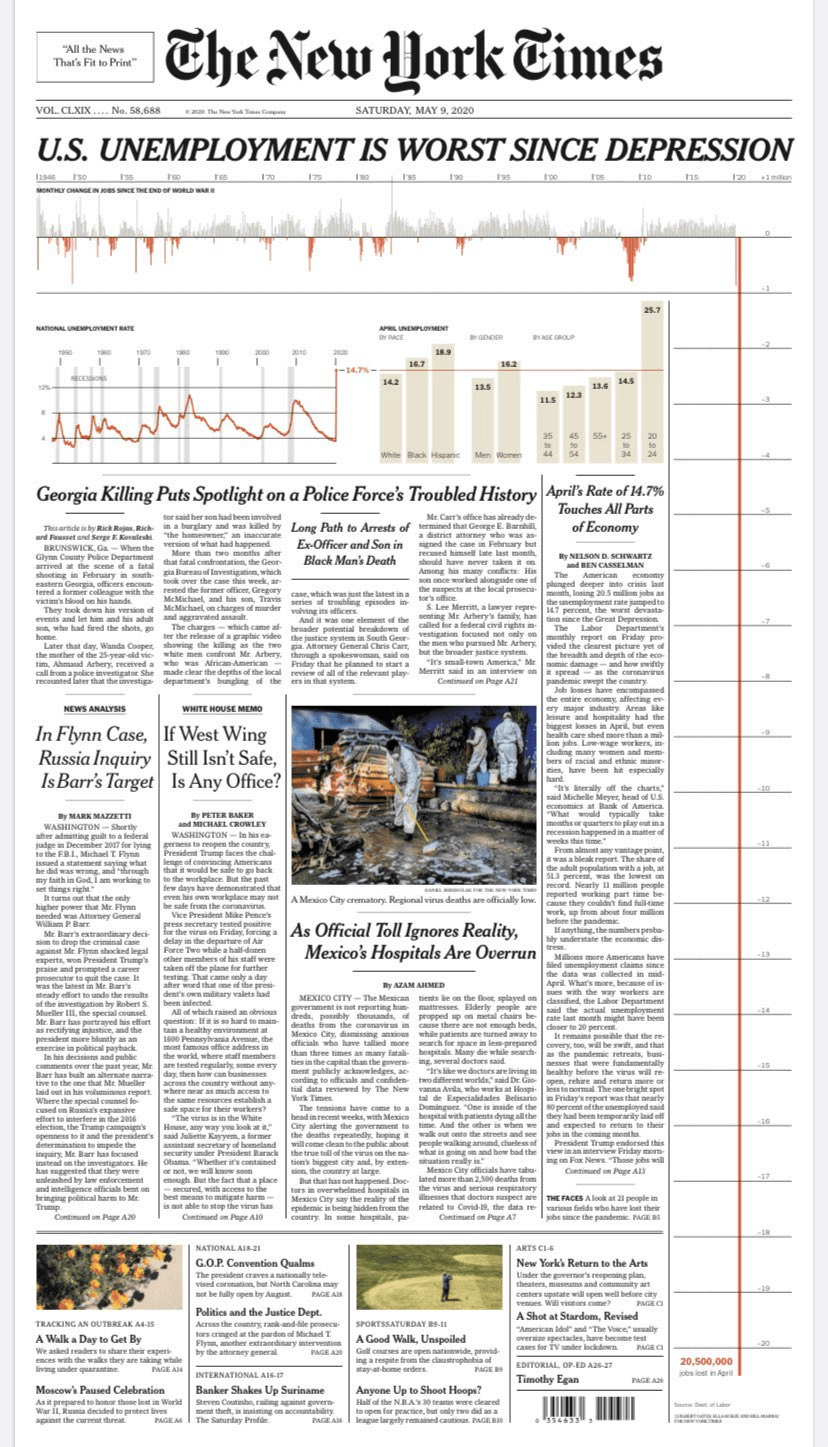
Jobs
So, let's start with Trump's #1 lasting impact: our tattered jobs market.
His mismanagement of the economic response to Covid-19 has resulted in the first presidency since Truman where we will end the term with net negative job growth.
Remember that feeling of economic stagnation at the end of George W. Bush's second term, where the Iraq War hung over the economy as a black cloud, and then we were struck by the 2008 financial crisis in Bush's final year?
Even in that period of 2000-2008... we added 1 million jobs.
We are much worse than that now.
We will end Trump's term having lost 4 million jobs. Carefully study this chart below.
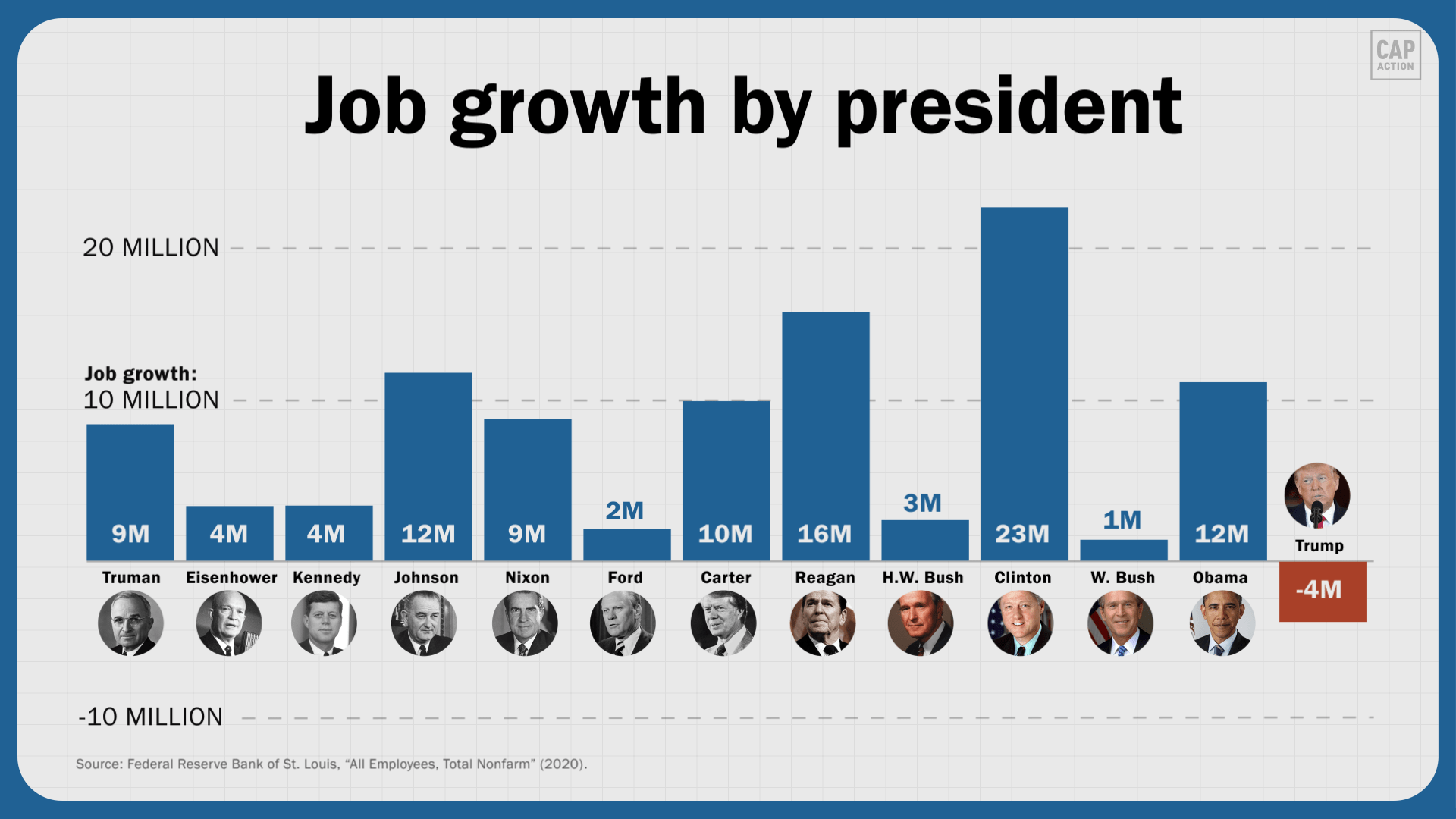
Job growth is the #1 thing that presidents can affect through their public policy.
In the last 3 decades, we had 3 "pro-jobs" presidents: Reagan (Republican), Clinton (Democrat), and Obama (Democrat). You may have disagreed with parts of their policy platform — I certainly did. But you can't deny their jobs record: 16M new jobs under Reagan, 23M under Clinton, and 12M under Obama. Under Trump, we're going to lose 4 million jobs.
For example, the Obama recovery, digging the economy out of the 2008 financial crisis, resulted in this job growth recovery graph:
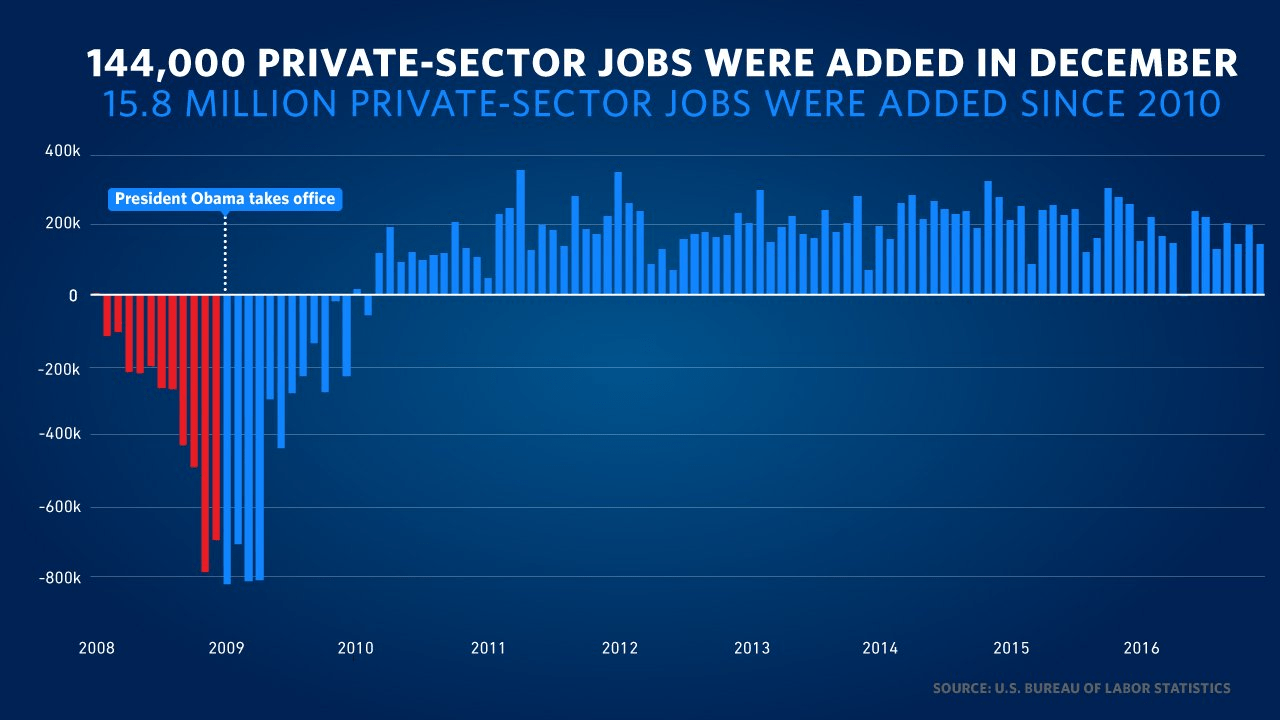
The Trump graph is like this one, but in reverse.
In 2020, Trump's mismanagement has wiped out a third of the job gains of Obama's entire 2 terms.
It's the worst economic mismanagement since Herbert Hoover during the height of The Great Depression.
Here is Trump's record contrasted to every other modern president we have data on. Trump is the yellow line which looks very unlike all the others.
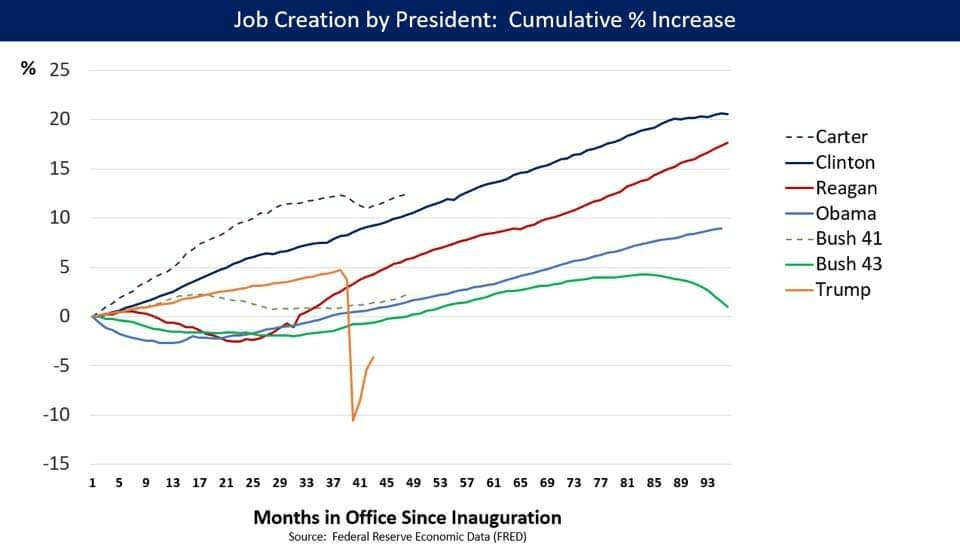
This is not a normal presidency — and it is abnormal in a bad way for everyone's economic security.
Why will Biden do a better job on jobs than Trump?
Quite simple: Trump is a pseudo-capitalist, whose idea of capitalism is low taxes for people who inherited millions of dollars, like he did. A real capitalist believes that the measure of an economy involves access to jobs, job security, real income, reduced taxes for workers (not corporations and business executives), and a robust consumer economy. A pseudo-capitalist believes that the stock market is the economy. The stock market is a casino layered over the economy. Trump has bad luck running casinos, too.
Trump's tax giveaway to the wealthiest individuals and corporations represents his personal and political worldview on taxes — which is that rich people like him shouldn't pay any. His giveaway for corporations that are already hoarding too much cash, and who spend the savings primarily on stock buybacks, rather than on hiring, is the most egregious of all of this. They weren't even asking for the cuts, but they got them anyway. And they don't even know what to do with the excess cash — so, they use it to reinvest in their own stock.
Trump is not a real businessman, he simply played one on TV. As a result, he doesn't care about the real economy — only the one on CNBC, that is, stock gains. He has no clue about the plight of the small business owner or honest worker, trying to put food on the table as a real contributor to our great economy. He thinks people like this are just "suckers".
Biden, by stark contrast, is pro-worker capitalist whose Vice Presidential background is about promoting job growth in the modern capitalist economy. What does that mean? He is not raising taxes on anyone making $400,000 per year or less, for starters. That is a solid campaign promise you can count on. But he is raising taxes on people who make more than that, or people who make money primarily from "inherited" or "rentier" wealth. This is what every economist — left, right, and center — knows we need to do to restart our economy.
People who don't work for their money — those people, not working people — should circulate cash back into the productive and consumer economy, spurring job growth through public and private programs. They can't just earn infinite wealth by sitting back, putting their feet up, and riding out a stock portfolio.
By taxing those wealthy non-productive folks, Biden will be able to get money into government programs that drive up employment. This includes the most obvious program of all: getting our economy going again, not via lockdowns, but via a massive, pervasive, and ubiquitous national Covid-19 testing program.
We desperately need more employment for society to move forward. And we desperately need a national testing program for consumers to feel confident moving about freely in our economy, at least until the rollout of a vaccine.
Big federal infrastructure programs enjoy bi-partisan support and create manufacturing jobs, service economy jobs, technology jobs, healthcare jobs, and so on. For example, only the federal government can expand the number of nurses and doctors in the economy. Only the federal government can rebuild bridges, tunnels, high-speed rail, and roads. Only the federal government can push more funding for DARPA, SBIR, and similar programs. Only the federal government can expand public education at the start of life, and expand opportunities for elder care jobs at the end of life. And with a desperately high unemployment rate, we need to return to full employment for this economy to take off again.
Health
It's not hard to understand that on public health, the past 6 months have been a disaster. You only need one graph here.
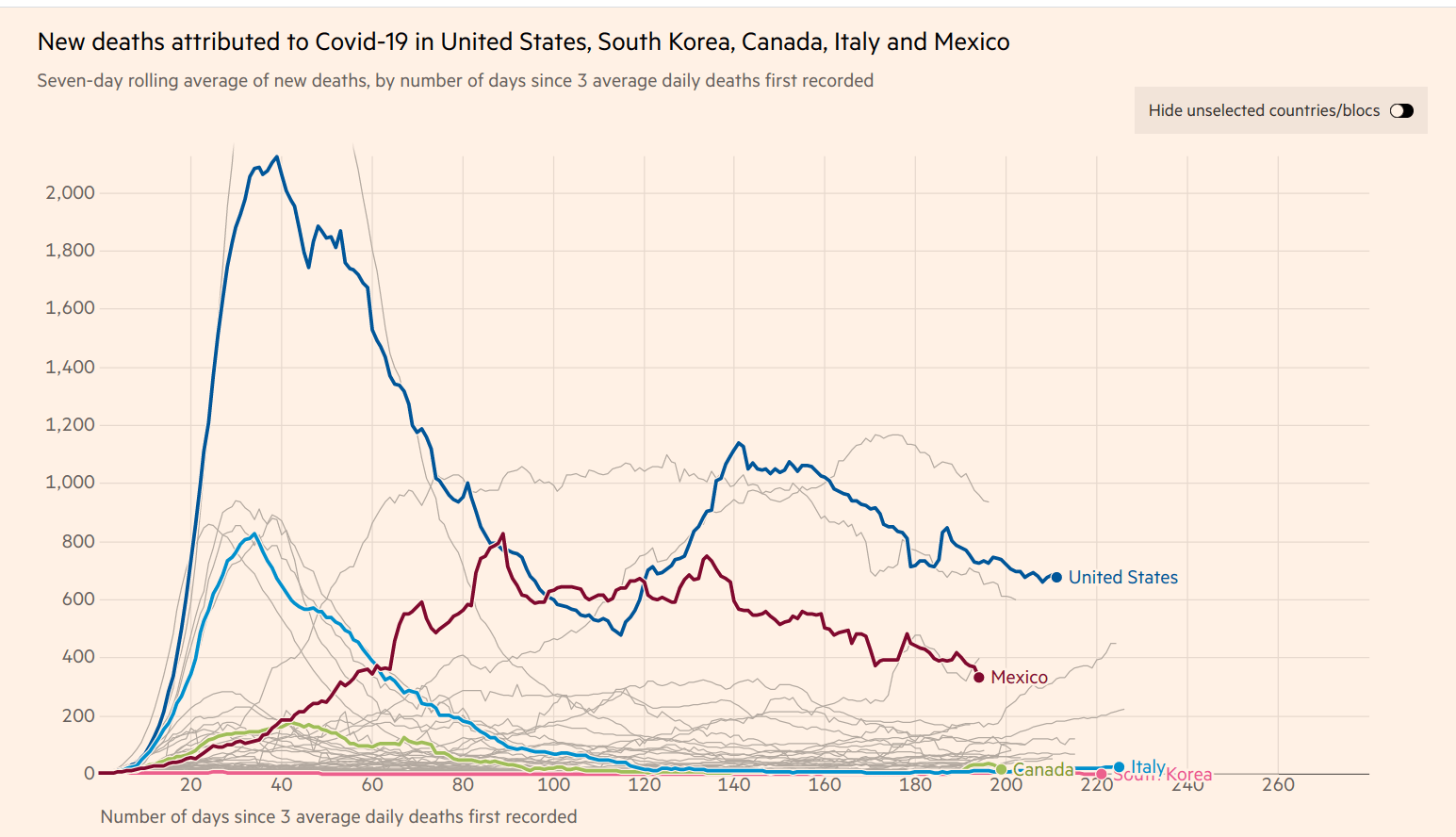
Above we have something like 100 countries plotted. Put simply, we have one of the worst per-capita death rates in the entire world. Our death rate is akin to only a few "poor" and "backward" countries, like Brazil, Iran, and Mexico. Meanwhile, 3 wealthy countries that were hard-hit: South Korea, Italy, and Canada — all had dramatically lower death rates per million. You can barely see them in this graph: they are scrunched at the bottom-right since their daily death rates are near-zero.
In fact, as you can see in this graph, they are suffering nowhere near the outbreak we are right now. This has nothing to do with bad luck, and everything to do with federal mismanagement. Italy is only recently struggling with a second wave, despite being one of the earliest hit and hardest hit. This is because Italy locked down early and hard, but did not adequately ramp a massive test and trace program on that foundation. By contrast, South Korea did. Thus, South Korea has all but entirely contained the virus throughout this crisis, and thus had the lowest impact on economic activity of any wealthy nation, as well as one of the lowest death counts. (444 deaths in a population of 50+ million, as of October 2020.) Under Trump, we did neither the Italian model nor the South Korean model. We simply flailed and allowed for rapid uncontrolled spread throughout the States. The result is 220,000 deaths, over 200,000 of which were completely preventable.
As for individual healthcare, the choice couldn't be starker.
Obama/Biden rolled out Obamacare, a flawed health plan that nonetheless expanded coverage for over 20,000,000 Americans, and forced healthcare insurance companies to cover people with preexisting conditions.
Lack of coverage for preexisting conditions, as a policy, was one of the cruelest aspects of an unregulated health insurance system. And one of the cruelest aspects of the 2017-2019 GOP platform is that they wanted to destroy Obamacare — mainly for political reasons — and thus return to that cruel world of high-priced healthcare for those with chronic illness.
As it stands now, because Obamacare remains the law of the land, people with conditions like diabetes, heart problems, breathing problems, and so on, can still get coverage.
Remember: Trump attempted to destroy this law altogether.
And: he still wants to destroy it, even despite the dual unemployment and public health crisis of Covid-19.
This is not the way forward on healthcare. Here's a graph of our uninsured rate from 2008 (the height of the financial crisis) through 2018, several years after Obamacare took effect.
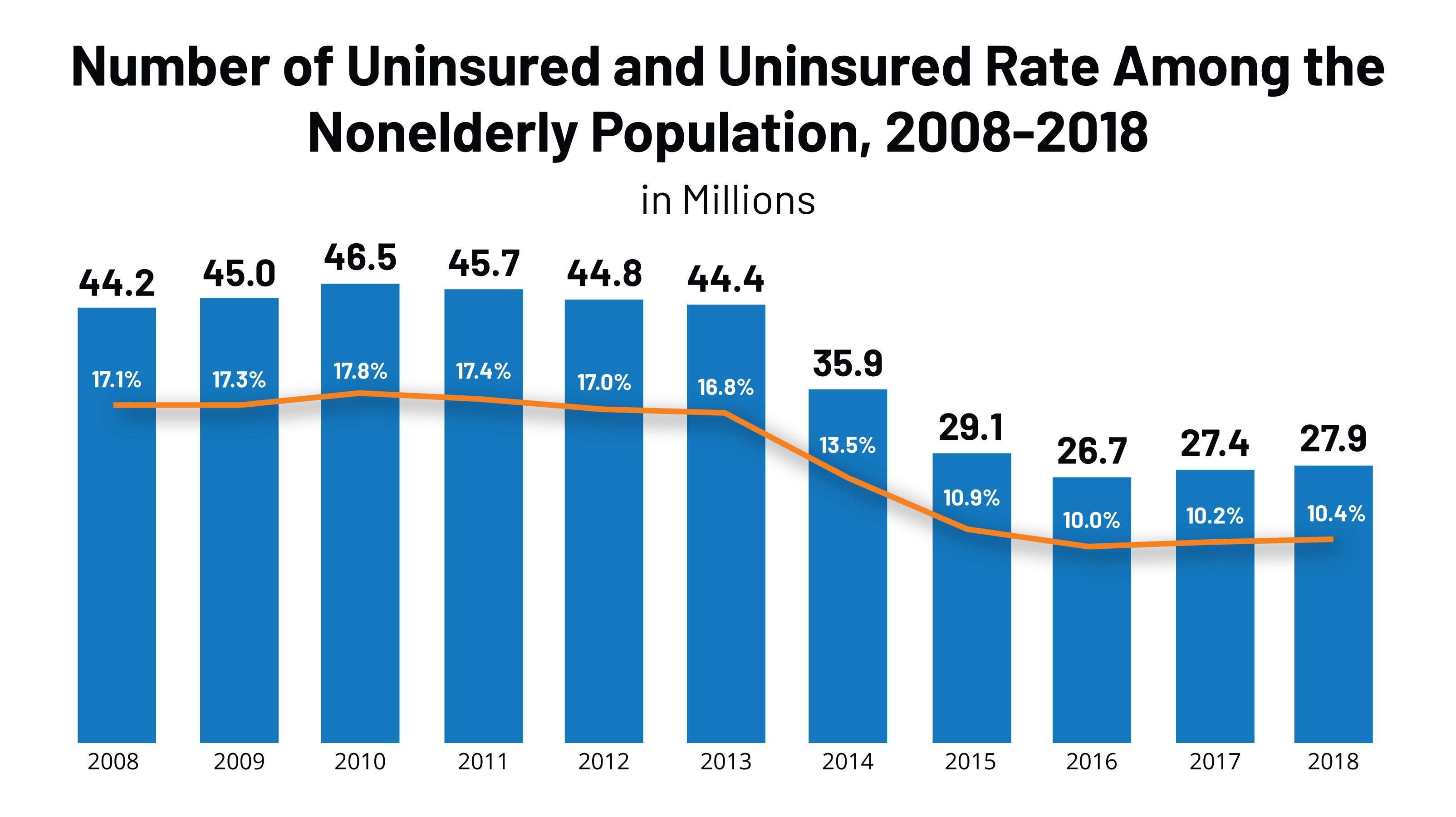
As you can see here, Obamacare's legacy was to get 20,000,000 Americans (twenty million humans) covered by health insurance, so they could get the care they needed. And this has held up in recent years. Trump wanted us to return to these staggering 2012 levels of uninsured. Think about that.
Biden will ensure Obamacare lives on, but that it is revised, evolved, and expanded in all the positive areas we've learned about in the past few years. After all, this is still a young regulation.
Most people who claim to be dissatisfied with Obamacare don't understand how health insurance worked before and after. They instead are just dissatisfied with corporatized medicine, or their employer-sponsored plan, and usually for good reason. But Obamacare's results have already been positive. It's imperative to continue to improve upon it.
By the way, the most unpopular aspect of Obamacare — the individual mandate — was actually already repealed at the federal level. So when Republicans and Trump talk about "killing", "repealing", "overturning" Obamacare today, they are talking very specifically about killing its popular aspects: coverage for preexisting conditions, access to the state marketplaces, and thus universal access to (somewhat) affordable insurance coverage.
It turns out, on the data, the individual mandate either was never necessary, or is no longer necessary. It's not materially affecting the rate of uninsured. It turns out the Obamacare marketplaces are popular even without the mandate! Remember that since this is a young regulation, we're still learning.
Canada and England have had federal healthcare systems that they have evolved since the end of WW2, for 7 decades. We are only just learning how to manage our nation's healthcare system in the 2000s, after spending 50 years under a "corporatized" private insurance network that was supported mainly by our nation's largest employers, during a time when lifelong employment at a single company was a much more common reality than it is today.
Biden has also publicly stated he will reduce the eligibility age for Medicare to 60 (currently it is 65), which will expand our US healthcare system's most popular program to cover more people, and to remove those people from the rolls of the health insurance companies, thus reducing everyone's health insurance premiums, making healthcare access cheaper for all. And cutting into health insurance company profits, as we should be doing.
If Covid-19 has proven anything, it's that fixing healthcare should be America's #1 national goal. We have a mix of systems in play today:
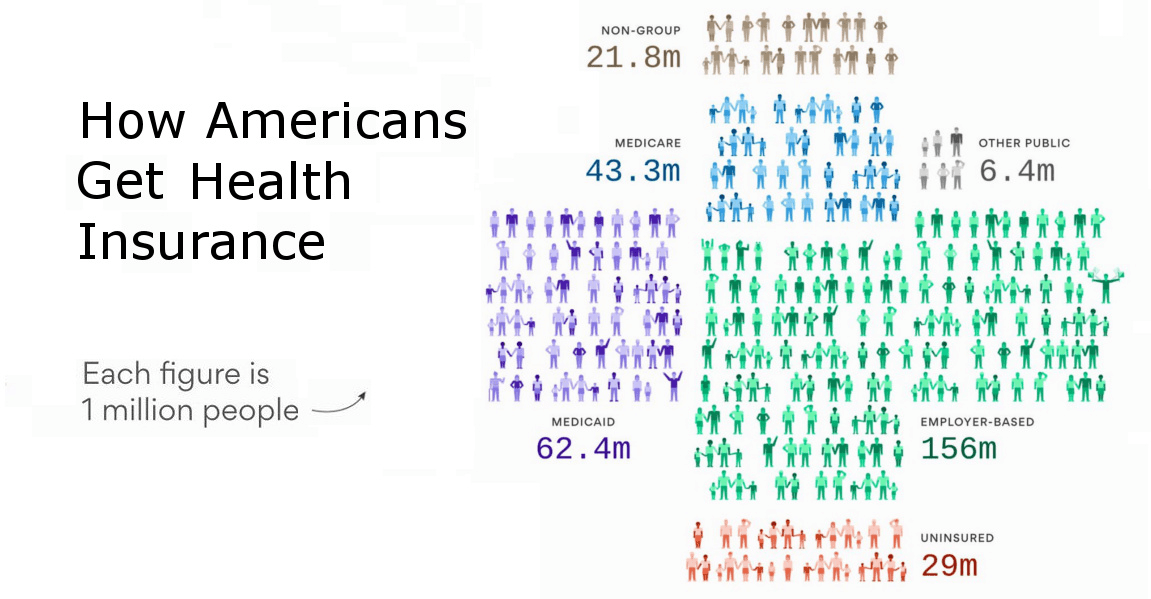
... but, overall, this system results in the worst return on investment of any other wealthy nation:
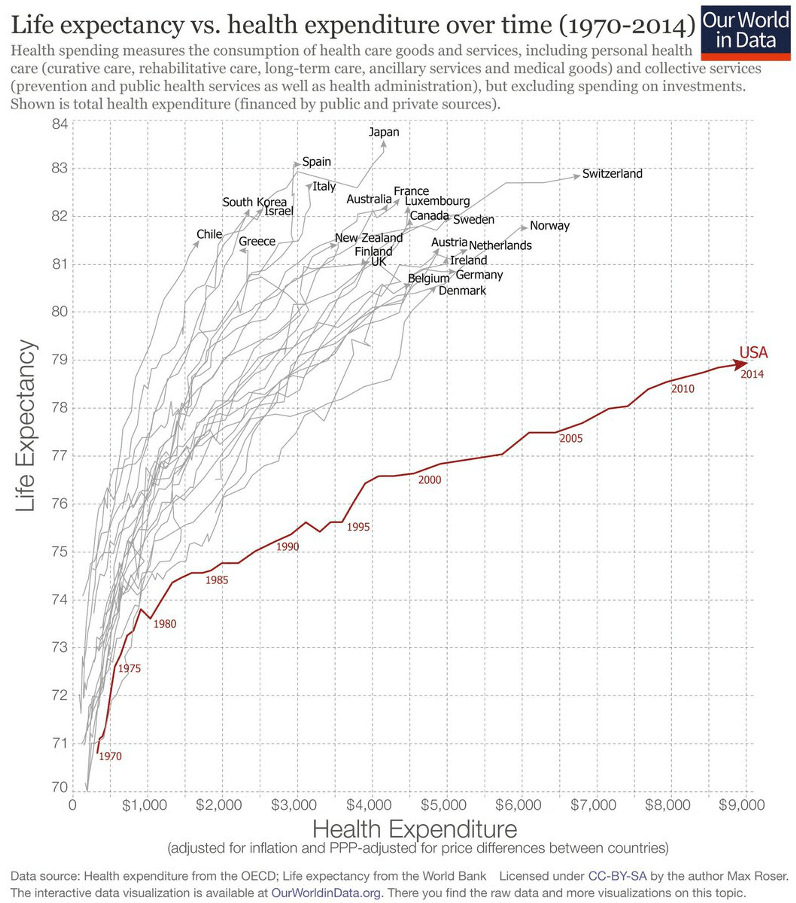
There is a lot of work to do. Yet, US private health insurance companies have record profits, even during a pandemic. We should, in no way, be helping health insurance companies any further — which is what would happen if Obamacare were repealed and replaced with so-called "free market" systems.
A "free market" system would mean even bigger profits for health insurance companies, and even less even coverage of chronically ill folks.
We don't need "free market" fundamentalism. Your health over the next 30 years is not like the latest iPhone. It's not a consumer commodity. It's an irreplaceable and sacred public (and private) good.
It's life and death, not iPhone or Android.
Nonetheless, we can borrow one idea from the market related to private health insurance: the idea of the power of consumer choice to drive down price and encourage good customer service. Biden has proposed a Medicare-based public option to create more choice and competition for private health insurance companies, competition they desperately need to drive down their ridiculously high prices.
The public option will be especially beneficial for those who don't have "good health plans" through large private employers, as the US remains the only wealthy nation where private healthcare is only affordable if you work for a large corporation with bargaining power against the insurance companies (and even then, expensive). Specifically:
"... a subsidized, Medicare-based public option will be available to individuals and small businesses. Under the Biden proposal, the employer-based system remains, but if you lose your job, or simply don't like or can't afford the insurance offered by your employer, you have another option."
The practical side effect of this is as follows:
- lower privater health insurance premiums for the average worker, because people aged 60-64 move to Medicare
- people can keep their employer-sponsored plans, if they have them and they like them
- BUT, the introduction a public option means if you leave a job (say, to start a small business), you get access to the same cheap healthcare that someone in Medicare has access to, instead of having to deal with the pain of COBRA
- AND, the introduction of a public option means that private health insurance companies have to compete on price and service to their customers in order to avoid people choosing the public option over their employer's plan
- Also: under Biden's plan, charging based on "preexisting conditions" will permanently become a thing of the past in the United States
This is, overall, a much better situation than the Trump alternative: a concerted effort to dismantle Obamacare, and likely, in the future, to defund or underfund Medicare — the only parts of our healthcare system that actually work right now.
Jobs & Health — that's it.
I believe in the modern economic world, jobs and healthcare are the two most important functions of our federal government.
A vote against Trump is a vote for jobs and for health. Simple as that.
Your job and your health. It's the minimum you should expect as a return on our high income tax rates. And it is what you should expect for all of your fellow citizens: a good job, and good health. It is what we all deserve as citizens of one of the world's wealthiest nations.
The truth is, on many other issues, the Democratic and Republican parties are not very far apart. Both parties support our military and national defense. Both are going to try to be hard on China, North Korea, Iran, and Cuba. And so forth. The men are very far apart in their outlook and attitude, but their parties are not very far apart on policy, at least not on these issues.
The last issue is competent federal leadership and competently-run federal agencies. That is, Trump has been the #1 crony politician of all time — appointing his friends (not well-qualified people) to all the top posts of federal government. And discouraging public trust in federal agencies like the FDA, CDC, FBI, and CIA.
His purpose here is nothing more than an attempt to control a political narrative around real-world problems he fails to manage. He has even publicly admitted to using his political influence over The CDC and HHS to slow down our Covid-19 testing program, an almost unthinkable dereliction of duty.
You don't have to love Biden. You could even personally like Trump — you could enjoy his firebrand personality, maverick status, and his strong narrative.
You could think he feels more "presidential" than Biden. That he seems more patriotic and more "America First". You could feel that Biden seems old and tired. That he's a Washington establishment figure.
But all of that doesn't matter. This isn't a popularity contest. This isn't a TV show. This is our country.
Trump is going to wreck jobs in the American economy, and he already has.
Trump is going to destroy healthcare in America, and he has already tried.
Trump is going to reduce the competence throughout our federal government, as he already has.
Trump is going to undermine trust in public institutions, as he already has.
Trump is going to place his incompetent buddies into important positions, as he already has.
It's time to move on from this national nightmare. In 2016, this was an interesting experiment in politics. In 2020, it's a dangerous flirtation with brinkmanship for our country.
For all of its potential flaws, we need to bring back competent leadership.
We need to drive America toward the greatness — starting with jobs and health — that she so desperately deserves.
There is only one ethical choice, therefore, in 2020 — and that is to vote against Trump. This is regardless of your political beliefs.
America's economy, health, and even our democracy depends on it.
Postscript
I shared an early draft of this essay with a close friend. I was afraid to publish it publicly, because I felt that it would politicize my blog, which I've been trying to keep relatively apolitical for years. He wrote back the following message, which finally convinced me to publish it:
"I can understand why you might be concerned about coming out publicly against Trump during a very political and divisive time in America, especially as someone whose career is entangled with his online identity. But, what struck me about your essay is that there's very little polemic, rhetoric, or overt politics in it. You lay out the data." ... "That data is stark, and clear. Some people may not agree with you on the premise: that is, that jobs and healthcare are important, or that the President can and should affect those areas, or perhaps they may believe that, though important, they are better addressed by the typical Republican position of deregulation (for jobs) and free market fundamentalism (for healthcare). But, assuming they don't believe in those two things, and they believe in the more pragmatic realism you lay out in this essay, I don't think anyone can make the claim, seeing these facts, that a vote for Trump is a vote for worker job security, or a vote for the public health." ... "And this is a good, almost apolitical reminder of that reality. It might even sway someone to turn out against Trump, who is otherwise thinking of staying home due to disgust with the bogeyman of Democratic Party rule. So, I'd say: publish the thing."
Besides, I am not alone in these beliefs.
For example, a long-time Republican in The Financial Times, is writing the following.
"The only path forward is a return to the principles of moderate Republicanism, backed by a broad coalition of Americans. This election could be the launch pad for a more inclusive Republican party, if we elect Mr. Biden by a margin that precludes Mr. Trump from challenging the results."
And a long-time Republican strategist, when interviewed, said the following:
"Someone who actually knows how to be president is going to be uniquely valued right now. That's because there is an exhaustion here. One of the benefits of a civil society should be that you don't have to think about politics all the time. And Trump denies you that right. He is always in your face. People are exhausted by it. People want a relief from that. You don't even have to believe that the president is going to save the world, or even change the world that much. You just crave a return a normalcy. People have a desperate longing for a lost normal."
... who, together with other Republicans, wrote this to his fellow Republican insiders in The Washington Post:
"As conservatives, we long argued that culture was the soul of America. We were right, but it is Trump who now assaults our nation's soul. The time for choosing is at hand. Will you choose a republic or an autocracy?"
It's time for a change.